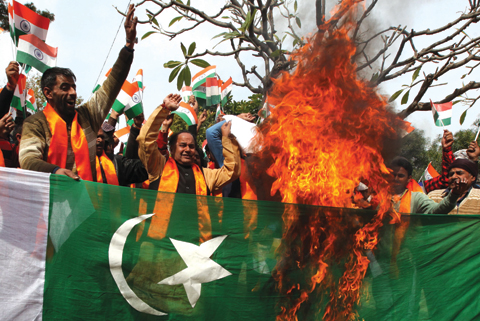Pakistani Taleban confirm deputy killed by drone, appoints new one
 KASHMIR: Indian supporters of the Hindu nationalist Dogra Front and Shiv Sena Jammu and Kashmir supporters burn the Pakistan national flag during a protest rally in Jammu. —AFP
KASHMIR: Indian supporters of the Hindu nationalist Dogra Front and Shiv Sena Jammu and Kashmir supporters burn the Pakistan national flag during a protest rally in Jammu. —AFPPESHAWAR: The Pakistani Taleban confirmed yesterday that their deputy leader was killed in a suspected US drone strike last week and said they had appointed a new deputy in his place. A pair of suspected US missile strikes killed the militant leader, Khalid Mehsud, also known by his alias Sajna, on Thursday last week in Afghanistan's Paktika province, near the border with Pakistan, Pakistani security officials said.
But there were conflicting accounts of the drone attack from Pakistani intelligence officials and militant sources. A spokesman for the Tehrik-e-Taleban Pakistan, also known as Pakistani Taleban, who are fighting to bring down the Pakistani state, told Reuters the drone strike was in the North Waziristan region, on the Pakistani side of the border. "We confirm that deputy head of the TTP Khalid Mehsud died in a drone strike," said the spokesman, Mohammad Khurasani.
He said Pakistani Taleban chief Mullah Fazlullah appointed a commander called Mufti Noor Wali Wali to replace their dead deputy. Wali, like his predecessor, would lead militants in South Waziristan, a rugged mountainous region on the Afghan border which has long been home to Pakistani, Afghan and al Qaeda-linked foreign militants. Militant sources said Wali, known by the nickname Ghar Starga, is a ruthless leader with experience working in Pakistani urban areas including the southern city of Karachi.
He studied in a seminary in Faisalabad city in the heartland province of Punjab and recently wrote a book eulogizing the founder of the Pakistani Taleban, Baitullah Mehsud, who was killed in a 2009 drone attack. While US and Afghan forces accuse Pakistan of failing to stop Afghan Taleban militants using safe havens on the Pakistani side of the border, Pakistani Taleban militants have been waging a campaign of bombings and other attacks on Pakistan's security forces. The Pakistani military mounted a major offensive against the militants in 2014, forcing many of them to withdrawn into Afghanistan.
The border region is off limits to journalists and verifying information independently is difficult. US drone strikes in the border region have picked up since US President Donald Trump took office in January 2017, though they are a long way off their peak in 2010. Relations between the United States and Pakistan have been strained since Jan 1 when Trump's denounced Pakistani "lies and deceit" over its support for the Afghan Taleban and their allies. Last month, the United States suspended about $2 billion assistance to Pakistan. Pakistan denies sheltering militants.
Pakistan warns India
In another development, Pakistan warned India against cross-border strikes in the disputed region of Kashmir after Indian authorities blamed a Pakistan-based group for an attack on an army camp in which soldiers and their families were targeted. Saturday's attack on the camp near Jammu, the winter capital of the revolt-torn state of Jammu and Kashmir, was the worst in months, with five soldiers and the father of one of the soldiers killed and women and children among the ten wounded.
India said the heavily armed attackers were members of the Pakistan-based Jaish-e-Mohammad (JeM) militant group, drawing criticism from Pakistan about rushing to judgment without a full inquiry. "It is a well established pattern that Indian officials begin making irresponsible statements and leveling unfounded allegations, even before any proper investigation in any incident has been initiated," Pakistan's foreign ministry said in a statement.
India, it said, was making these allegations to divert attention from its brutality in trying to control the armed revolt in Kashmir, and warned against any retaliatory measures across the Line of Control that divides Kashmir between the nuclear-armed countries. "We hope that the international community would urge India to stop the untold atrocities and gross violations of human rights in IoK (Indian Occupied Kashmir) (and) refrain from any misadventure across the Line of Control..." it said.
India has long accused Pakistan of training and arming militants and helping them infiltrate across the heavily militarized Line of Control into Jammu and Kashmir, its only Muslim majority state. The head of the Jammu and Kashmir state police, SP Vaid, told reporters over the weekend that they had communications intercepts pointing to the JeM, which has emerged as a top group fighting hundreds of thousands of Indian forces in Kashmir. The army said the attackers wore fatigues and had assault rifles, a grenade launcher and grenades.
In 2016, India said its elite troops had crossed the Line of Control into Pakistan and carried out a raid on militants after 18 soldiers were killed in an attack on an Indian army base in Kashmir. Pakistan denies giving material aid to the fighters in Kashmir and says it only provides diplomatic and moral support to the Kashmiri people in their struggle for self-determination. Yesterday, Indian soldiers foiled an attack on another camp in Srinagar, the summer capital of Indian Kashmir. - Agencies









